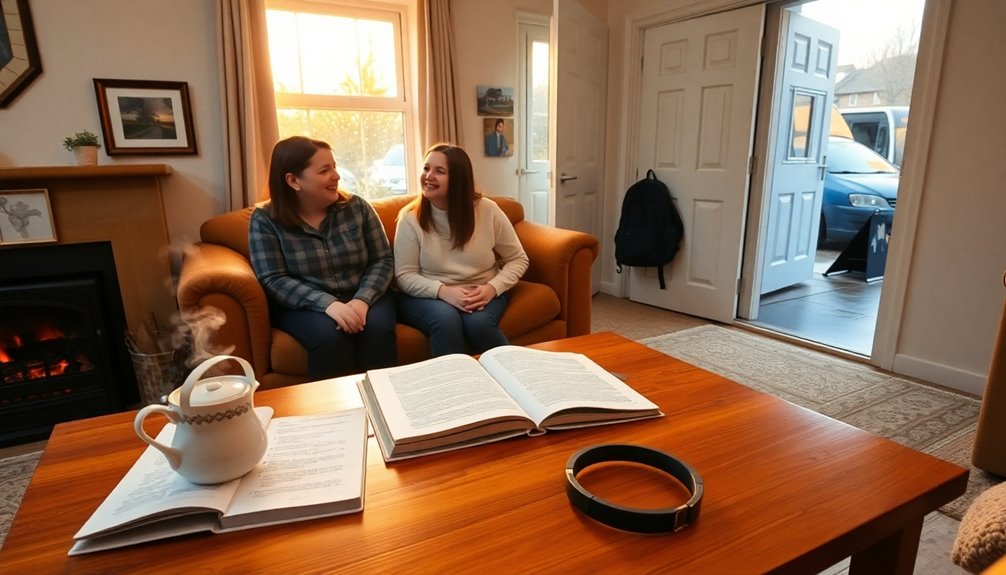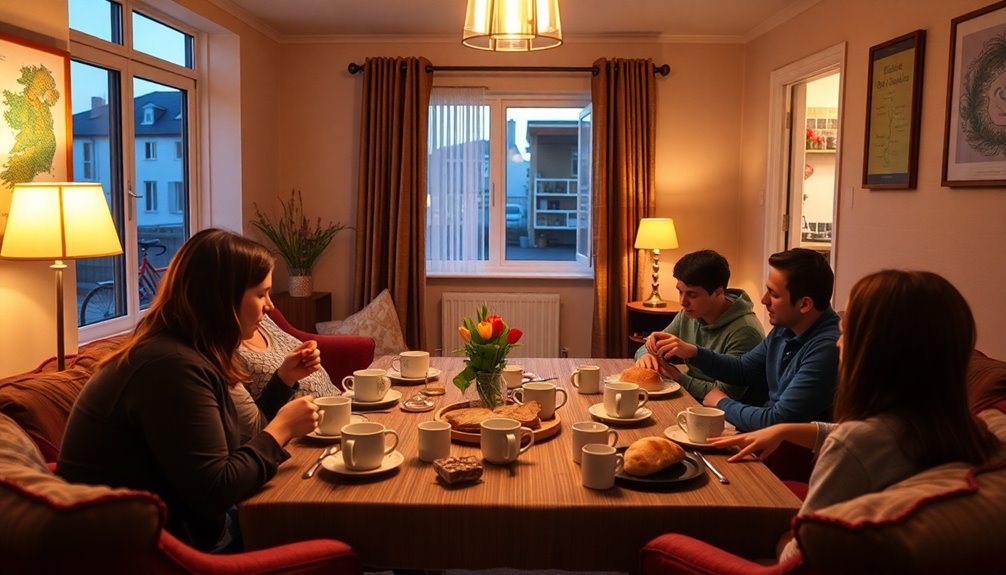
If you live with a top Irish homestay, you’ll get fast, natural English practice and a real feel for local life, plus built‑in support and cultural insights. You’ll trade some privacy and strict independence for household routines, shared spaces, and occasional cultural bumps. Clear communication and setting boundaries will help a lot, and costs usually include meals and utilities. Keep going and you’ll find practical tips, comparison points, and selection criteria to help choose the right family.
How Homestays Work for English Learners in Ireland
When you choose a homestay in Ireland, you’ll live with a local family who provides a private room, meals, and daily chances to practice English in real-life settings. You’ll want clear homestay expectations from the start—arrival times, chores, internet use, and meal schedules—so you can keep your independence without friction. Observe host family dynamics: some households chat at the table, others value quiet evenings. You’ll benefit by setting boundaries kindly and asking about routines; that lets you explore freely while fitting in. Be ready to adapt: respect house rules, join activities when you like, and maintain communication. With straightforward expectations and open dialogue, you’ll enjoy autonomy and genuine cultural immersion.
Benefits of Living With an Irish Host Family
After you’ve agreed on routines and house rules, living with an Irish host family gives you more than a roof and meals — it offers daily, natural opportunities to improve your English, understand local customs, and build friendships that make Ireland feel like home. You’ll enjoy authentic cultural immersion through shared meals, outings, and conversations that fit your pace. You can practice speaking freely, observe family dynamics, and gain confidence without rigid schedules. Hosts often let you explore independently while offering local tips, so you keep your freedom. Below is a snapshot of typical benefits:
| Benefit | Example |
|---|---|
| Language practice | Dinner conversation |
| Local insight | Pub etiquette |
| Support | Emergency help |
| Flexibility | Independent weekends |
Common Drawbacks and Challenges of Homestays
You may find adjusting to Irish customs, meal times, and household routines challenging at first, especially if they differ a lot from what you’re used to. You might also have less privacy and personal space than you expect, with shared bathrooms or common areas. Being aware of these issues early will help you set boundaries and manage expectations with your host.
Cultural Adjustment Hurdles
Because homestays immerse you in a family’s daily life, they’ll often bring unexpected cultural bumps—different meal routines, privacy norms, humor, or expectations about chores and punctuality—that can feel challenging at first. You’ll notice cultural differences in small habits and communication styles that test your independence, but that doesn’t mean you’re trapped. Use clear adjustment strategies: ask questions early, set boundaries politely, and suggest routines that suit both you and your hosts. Stay curious and flexible, but also honest about needs like study time or social plans. If something consistently limits your freedom, raise it calmly or involve your placement coordinator. With proactive communication and mutual respect, these hurdles can become growth opportunities rather than permanent restrictions.
Privacy and Space Limits
Shifting from traversing cultural differences, you’ll also face practical limits on privacy and personal space in a homestay. You might want freedom to study, call friends, or relax without interruption, but privacy concerns can arise—shared bathrooms, thin walls, and hosts who expect involvement. Set clear personal boundaries early: agree on times for quiet, use of common areas, and rules for guests. If that feels tight, consider alternative housing. Below is a quick comparison to help you weigh options and keep your independence.
| Situation | Typical Issue | Quick Fix |
|---|---|---|
| Shared bathroom | Scheduling conflicts | Create a timetable |
| Thin walls | Overheard conversations | Use earplugs, white noise |
| Host involvement | Unexpected visits | Agree visiting hours |
| Limited storage | Cluttered space | Declutter, use bins |
Criteria for Choosing the Best Homestay Family
When choosing a homestay family, focus on how well their lifestyle, communication, and expectations match yours so you’ll feel comfortable and make the most progress in English. You’ll want to check family dynamics—are they lively or relaxed, multi-generational or just a couple—and pick what lets you move freely and learn without pressure. Ask about communication styles: do they text, chat at meals, or expect formal interaction? Confirm routines around meal times, visitors, and quiet hours so your autonomy isn’t curtailed. Also verify host experience with students, willingness to correct your English, and any house rules that might limit your independence. Choosing with these criteria keeps your daily life flexible and supports steady language growth.
Comparing Homestay vs. Student Housing and Shared Flats

While homestays immerse you in everyday Irish life and offer built‑in language practice with a family, student housing and shared flats give you more independence and peer interaction—so the best choice depends on whether you want guided cultural immersion or a more autonomous, social student experience. You’ll get clear homestay benefits like regular conversation, local routines, and cultural insight that speed language learning and offer structure. In contrast, student housing and shared flats let you set your own schedule, host friends, and live with peers who share study and social activities. For freedom-seeking learners, housing comparisons should focus on privacy, noise, social opportunities, and how much daily support you want. Decide whether you need mentoring or maximum independence.
Typical Costs and What’s Included in Homestay Fees
After weighing whether you want family-guided immersion or more independence in student housing, you’ll also want to know what homestays cost and what those fees actually cover. Costs vary by city and season; expect basic homestay pricing from about €150–€300 per week for a private room, higher in Dublin. Short stays may carry a per-night premium and placement or agency fees can add upfront costs. Most hosts include breakfast and either one or two evening meals weekly; laundry, Wi‑Fi, heating and utilities are commonly part of the package. Some homestays offer use of a kitchen, bike storage or light transport help as included amenities. Check contract details so you’re clear on extra charges for guests, cleaning or meal upgrades.
Practical Tips for a Positive Homestay Experience
Because homestays work best when everyone understands expectations, start by clarifying house rules, meal times, internet use and guest policies as soon as you arrive; a short checklist or polite conversation will prevent most misunderstandings and show you respect the family’s routine. Once settled, balance your independence with homestay etiquette: keep shared spaces tidy, ask before inviting friends, and follow quiet hours. Use simple, direct communication strategies—ask for clarification, offer your schedule, and give polite feedback if something’s not working. Be proactive about cultural differences and show curiosity; small gestures like helping with dishes go a long way. If boundaries are crossed, address them calmly and promptly so you can enjoy freedom while maintaining harmony.
Some Questions Answered
Can Homestays Accommodate Medical Dietary Needs?
Yes — like a lighthouse guiding you, homestays can accommodate medical dietary needs; they’ll respect dietary preferences and arrange health accommodations, but you should clearly communicate restrictions beforehand to keep your freedom and safety intact.
Are Host Families Background-Checked Internationally?
Usually yes, but you should check: host family requirements vary, and not all families meet international standards automatically. You’ll want agencies that perform international background checks and clear, transparent vetting so you can travel freely and confidently.
Is Wi‑Fi Speed Guaranteed for Online Classes?
No, you can’t assume wi‑fi speed’s guaranteed for online classes; wifi reliability varies by homestay, so you’ll want to confirm speeds, ask about backups, and choose hosts who respect your online learning freedom and schedule.
Can I Receive Parcels at the Homestay Address?
Yes — you can usually receive parcels at the homestay address, but policies vary; check homestay policies first, confirm parcel delivery procedures, and choose hosts who respect your freedom and privacy for reliable handling.
Are Short-Term Trial Stays Available Before Committing?
Yes — you can usually book short-term trial stays to test family compatibility; you’ll get freedom to explore routines, set boundaries, and decide if longer homestay life fits your pace before committing.
